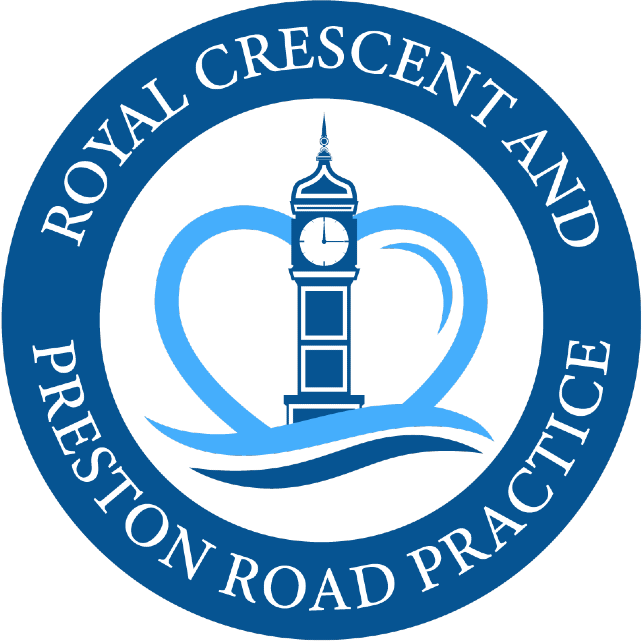We use cookies to help provide you with the best possible online experience.
By using this site, you agree that we may store and access cookies on your device. Cookie policy.
Cookie settings.
Functional Cookies
Functional Cookies are enabled by default at all times so that we can save your preferences for cookie settings and ensure site works and delivers best experience.
3rd Party Cookies
This website uses Google Analytics to collect anonymous information such as the number of visitors to the site, and the most popular pages.
Keeping this cookie enabled helps us to improve our website.
Royal Crescent and Preston Road Practice
FacebookYour Information
What you need to know
This webpage explains why information is collected about you and the ways in which this information may be used.
Why we collect information about you
Your doctor and other health professionals caring for you keep records about your health and any treatment and care you receive from the National Health Service.
These help ensure that you receive the best possible care from us. They may be written down (manual records), or held on a computer. The records may include:
- basic details about you, such as address and next of kin
- contacts we have had with you, such as clinic visits
- notes and reports about your health and any treatment and care you need
- details and records about the treatment and care you receive
- results of investigations, such as X-rays and laboratory tests
- relevant information from other health professionals, relatives or those who care for you and know you well
How your records are used to help you
Your records are used to guide and administer the care you receive to ensure:
- your Doctor, Nurse or any other healthcare professionals involved in your care have accurate and up-to date information to assess your health and decide what care you need, when you visit in the future
- full information is available should you see another doctor, or be referred to a specialist or another part of the NHS
- there is a good basis for assessing the type and quality of care you have received
- your concerns can be properly investigated if you need to complain
How your records are used to help the NHS
Your information may also be used to help us:
- look after the health of the general public
- audit NHS accounts and services
- investigate complaints, legal claims or untoward incidents
- make sure our services can meet patient needs in the future
- prepare statistics on NHS performance
- review the care we provide to ensure it is of the highest standard
- teach and train healthcare professionals
- conduct health research and development
Some of this information will be held centrally, but where this is used for statistical purposes stringent measures are taken to ensure that individual patients cannot be identified.
Where it is not possible to use anonymised information, personally identifiable information may be used for essential NHS purposes. These may include research and auditing services. This would normally be done with your consent or using the lawful basis of performance of a task carried out in the public interest.
How we keep your records confidential
Everyone working for the NHS has a legal duty to keep information about you confidential.
You may be receiving care from other organizations as well as the NHS (like Social Services). We may need to share some information about you so we can all work together for your benefit.
We will only ever use or pass on information about you if others involved in your care have a genuine need for it. We will not disclose your information to third parties without your permission unless there are exceptional circumstances, such as when the health or safety of others is at risk or where the law requires information to be passed on.
Anyone who receives information from us is also under a legal duty to keep it confidential and secure.
We are required by law to report certain information to the appropriate authorities. This is only provided after formal permission has been given by a qualified health professional. Occasions when we must pass on information include:
- notification of new births
- where we encounter infectious diseases which may endanger the safety of others, such as Meningitis or Measles (but not HIV/AIDS)
- where a formal court order has been issued
Our guiding principle is that we are holding your records in strict confidence.
How you can get access to your own health records
You have a right under Data Protection legislation to find out what information about you is held on computer and in certain manual records. You can also request copies.
In order to access your records you need to let the Practice know by making a Subject Access Request (SAR). Usually there is no charge for this unless the request is excessive or complicated. The practice will respond within one month of receipt of your request.
In certain circumstances your right to see some details in your health records may be limited in your own interest or for other reasons.
Who are our partner organisations?
Our principal partner organisations:
- other NHS hospitals;
- relevant GP Practices;
- dentists, opticians and pharmacies;
- Private Sector Providers (private hospitals, care homes, hospices, contractors providing services to the NHS).
- Voluntary Sector Providers who are directly involved in your care;
- Ambulance Trusts;
- Specialist Trusts;
- Clinical Commissioning Groups;
- NHS 111;
- out of Hours medical service;
- NHS walk in centres;
- NHS England;
- NHS Digital
This list is not intended to be exhaustive.
